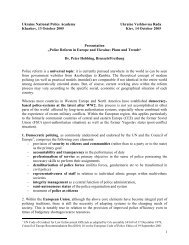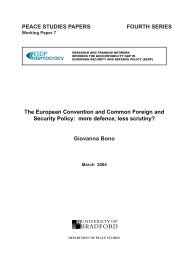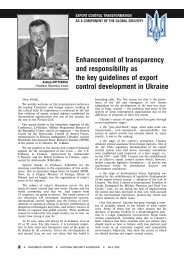The Challenges and Opportunities of Security Sector Reform in Post ...
The Challenges and Opportunities of Security Sector Reform in Post ...
The Challenges and Opportunities of Security Sector Reform in Post ...
You also want an ePaper? Increase the reach of your titles
YUMPU automatically turns print PDFs into web optimized ePapers that Google loves.
expressed disquiet, rang<strong>in</strong>g from the most blunt, to the more tactful. Accord<strong>in</strong>g to one<br />
observer ‘the Special Representative <strong>of</strong> the United Nations Secretary General <strong>in</strong> Liberia,<br />
General Jacques Kle<strong>in</strong>, behaves like the Viceroy <strong>in</strong> Liberia, elicit<strong>in</strong>g mixed reactions from<br />
stakeholders’. 102 Accord<strong>in</strong>g to the Report <strong>of</strong> the CSDG-DCAF Mission <strong>of</strong> July/August<br />
2004,<br />
28<br />
Although Liberians appreciate immensely the security <strong>and</strong> stability provided by UN<br />
presence <strong>in</strong> Liberia, particularly Monrovia, there is a strong public perception that<br />
the UNMIL senior leadership disregards their views on how the country’s problems<br />
should be addressed. An issue <strong>of</strong> particular concern is the relationship between the<br />
chairman <strong>of</strong> the NTGL <strong>and</strong> the UN SRSG which has been characterised as ‘too<br />
cordial’, <strong>in</strong> effect mak<strong>in</strong>g a system <strong>of</strong> checks-<strong>and</strong>-balances impossible. Overall, the<br />
team sensed that there is a general lack <strong>of</strong> confidence between SRSG/UNMIL <strong>and</strong><br />
Liberians. 103<br />
Given the enormous <strong>and</strong> multidimensional challenges <strong>of</strong> post-conflict reconstruction, a<br />
person <strong>in</strong> the position <strong>of</strong> the SRSG could not have escaped some criticism. However, the<br />
cynicism <strong>and</strong> frustration with which many Liberians spoke <strong>of</strong> Mr Kle<strong>in</strong> gave the<br />
impression that the former UNSG was fast becom<strong>in</strong>g part <strong>of</strong> the problem for which he<br />
was appo<strong>in</strong>ted to f<strong>in</strong>d the solution. Several Liberians referred to him as ‘Governor-<br />
General’. Without prejudice to the validity <strong>of</strong> such criticisms, the essential po<strong>in</strong>t to note<br />
is that such perceptions have negatively affected the impression which many Liberians<br />
have <strong>of</strong> UNMIL, which the new UNMIL leadership would need to urgently address<br />
follow<strong>in</strong>g Mr Kle<strong>in</strong>’s sudden departure <strong>in</strong> April 2005.<br />
V. Conclusion <strong>and</strong> Recommendations<br />
<strong>The</strong> character <strong>of</strong> the security sector <strong>in</strong> Liberia is a product <strong>of</strong> the historical dom<strong>in</strong>ation <strong>of</strong><br />
the country by a settler population, <strong>and</strong> the concomitant contradictions which such<br />
dom<strong>in</strong>ation has generated. Thus even though Liberia was never formally colonised by<br />
another state, it was effectively subjugated by freed slaves from the United States <strong>and</strong><br />
their descendants, who appropriated the state, created <strong>and</strong> susta<strong>in</strong>ed a personalised<br />
security sector, <strong>and</strong> prevented popular participation. Even though it would amount to a<br />
gross over-simplification to attribute all <strong>of</strong> Liberia’s complex array <strong>of</strong> challenges to this<br />
s<strong>in</strong>gular factor, it must be recognised that the asymmetrical social relations which ensued<br />
has created a wide cleavage between the state <strong>and</strong> the vast majority <strong>of</strong> Liberians. <strong>The</strong><br />
ensu<strong>in</strong>g dichotomised existence has been at the core <strong>of</strong> Liberia’s socio-economic <strong>and</strong><br />
political frictions. <strong>The</strong> seeds <strong>of</strong> what grew to be the Liberian security sector were sown<br />
by the elite to create a security structure for the preservation <strong>and</strong> protection <strong>of</strong> privileged<br />
<strong>in</strong>terests. Liberia has been <strong>in</strong> the throes <strong>of</strong> <strong>in</strong>stability <strong>and</strong> conflict s<strong>in</strong>ce Doe attempted <strong>in</strong><br />
the 1980s to supplant Americo-Liberian dom<strong>in</strong>ation with Krahn ethnic dom<strong>in</strong>ation.<br />
Thus, de facto, the raison d’être <strong>of</strong> the Liberian security sector has been the security <strong>of</strong> the<br />
state, <strong>of</strong>ten at the expense <strong>of</strong> the state <strong>of</strong> security.<br />
This paper analysed the general post-conflict reconstruction process <strong>in</strong> Liberia from a<br />
security governance perspective, <strong>and</strong> identified various factors which s<strong>in</strong>gularly <strong>and</strong><br />
102<br />
Kayode Fayemi, op. cit., p. 192.<br />
103<br />
CSDG-DCAF Report, op. cit., p. 6. (See Annex 2)

















